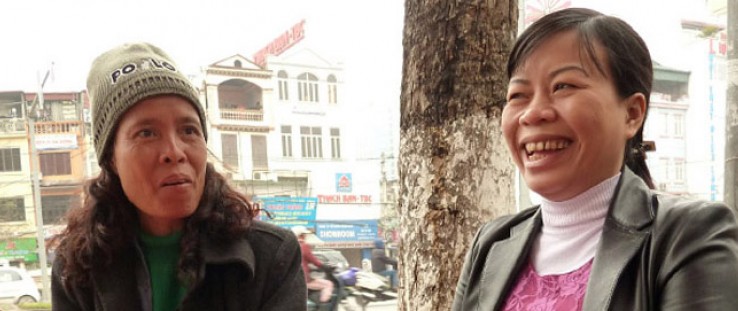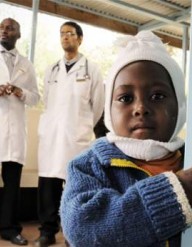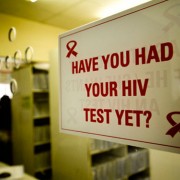 Pham Thi Minh, right, meets a loan recipient and member of a coalition of self-help groups supported by USAID and other donors in Hanoi.
Richard Nyberg, USAID
Pham Thi Minh, right, meets a loan recipient and member of a coalition of self-help groups supported by USAID and other donors in Hanoi.
Richard Nyberg, USAID
 Pham Thi Minh, right, meets a loan recipient and member of a coalition of self-help groups supported by USAID and other donors in Hanoi.
Richard Nyberg, USAID
Pham Thi Minh, right, meets a loan recipient and member of a coalition of self-help groups supported by USAID and other donors in Hanoi.
Richard Nyberg, USAID
Within two weeks of her release from a state drug rehabilitation center, Pham Thi Minh landed a health-promotion job and was voted by self-help peers as their leader. In just two years, she has built up a network of more than 1,000 women who support each other to stay safe from disease and help generate income to support their families.
“My life is changing so fast,” Minh said at her office in Hanoi. Recognized by local police and other authorities for her work, which is supported by USAID, Minh is taking her world by storm. This wasn’t easy though: she had to overcome a rocky start in life and defeat an 11-year heroin addiction to do it.
After her father died when she was just an infant, her mother had to provide for her five children by cooking the fried breadsticks eaten with Vietnam’s famous pho soup. Minh helped her mother with the business until she was 18, but increasingly she was attracted to the “fancy girls” and gang culture leading her down the road of drug addiction. Her mother tried everything to help her quit, using herbs and acupuncture, but to no avail.
“I did whatever I had to do to get money to feed my habit,” Minh said.
She spent time in jail and was sent to a state-run rehabilitation center three times, spending a total of three and a half years in the facility. While at the center for the last time, she met an outreach worker who talked to her about self-help groups for recovering female addicts and how they could support her when she was released. She gave it little thought at the time, but it was a meeting that changed her life.
From Addict to Leader
On Liberation Day, April 30, 2008, the annual holiday marking the end of the war, Minh was released. She joined the self-help group three days later, and showed immediate leadership potential. Within days, the group chose her as the leader. Although she initially resisted, she assumed the role six months later. Just after leaving the center, she also was hired as a peer educator in the USAID-supported Women’s Health Project in Hanoi.
Since that time, there has been no holding her back. Minh now coordinates a coalition that includes a network of 400 sexual partners of injecting drug users, 300 injecting drug users, and 280 street-based sex workers. Injecting drug use is the main behavior fueling the spread of HIV in Vietnam. HIV infection among drug users is particularly high—around 50 percent—in Vietnam’s main commercial centers such as Ho Chi Minh City and the port city of Hai Phong, and the mountainous regions of northwest Vietnam.
In addition to supporting these self-help groups, USAID also helps drug users overcome their heroin addiction through methadone treatment, which has been proven to stem the rate of HIV infection among people who use drugs. The national goal is to provide methadone to at least 80,000 heroin users by 2015. As of March 2011, USAID supplies methadone for the entire national program, and supports 10 methadone clinics in five provinces. To date, 1,900 heroin users have received methadone treatment through USAID support.
Minh’s coalition provides referrals to voluntary counseling and testing for sexually transmitted diseases, counseling and training on harm reduction, loans for women to generate income, and a drop-in center where women can meet others, take a shower, and receive support. Separately, she manages the “Bullet Point” self-help group for drug users.
“In the past, my only friends were drug users,” she said. “Now I can meet with other people and be treated as an equal among local and international NGOs. I’ve become a completely different person.”
In December 2010, Minh received a certificate of achievement from the chairman of the People’s Committee of Hanoi’s Hai Ba Trung District in recognition of her “outstanding achievements and contributions” in drug control. It was the first organization for drug users to be officially recognized by the government for its contribution. Minh is pleased that her district has seen how the community can respond to drug addiction and help fight HIV. “If my district can do that, other districts can do the same,” she said.
Pregnant with her first child, Minh, 35, continues to think about how she can help others. “People should know that they can stop taking heroin and do so much more with their lives,” she said. “Most important for women is that they are treated equally, and that they think and live positively.”












Comment
Make a general inquiry or suggest an improvement.